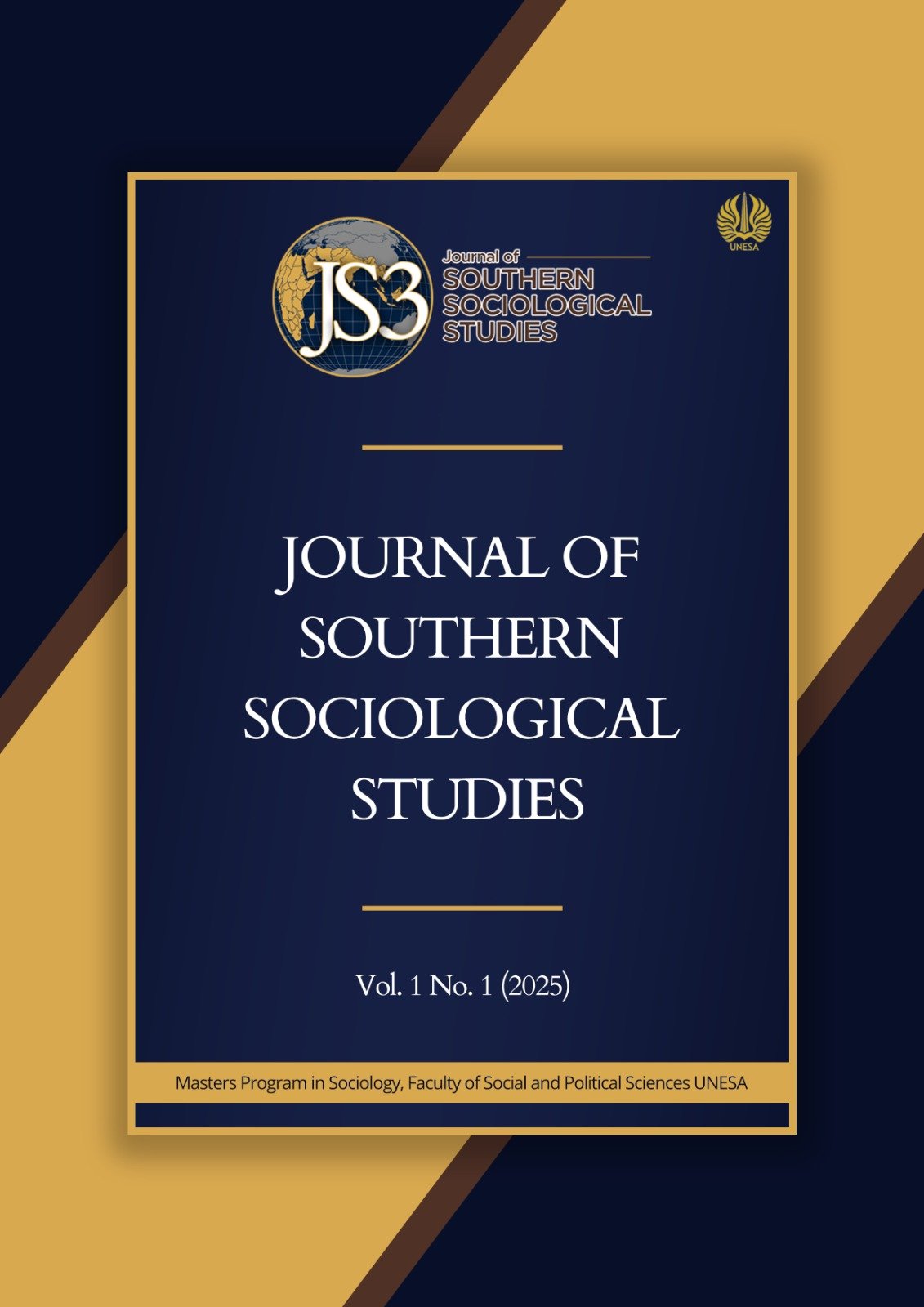The Islamic Educational Values in The Batimung Tradition
Implications for The Young Generation in Banjar District
DOI:
https://doi.org/10.26740/jsss.v1i1.40507Keywords:
Islamic Education; Batimung; Banjar Culture; Youth Character; Global SouthAbstract
This study investigates the Islamic educational values embodied in the Batimung tradition, a ritual steam bath practiced by the Banjar ethnic group in South Kalimantan, Indonesia. Positioned within a Global South framework, Batimung is analyzed as a site of cultural resilience and pedagogical innovation amid the pressures of globalization and epistemic hegemony. Utilizing a qualitative literature review, the study draws from academic sources published between 2015 and 2024 to examine Batimung’s moral, spiritual, ecological, and gendered dimensions. Findings reveal that Batimung fosters key Islamic values such as thaharah (purity), tazkiyah al-nafs (self-purification), muamalah (social ethics), and communal harmony through embodied, affective learning. Women’s central roles in ritual performance further highlight its function as a matrifocal space for moral transmission. Beyond its symbolic significance, Batimung offers transformative potential for Islamic education through culturally grounded curricula, experiential pedagogy, and environmental ethics. The study advocates for the formal recognition of Batimung within Islamic education policy and practice, emphasizing its relevance for character formation, intergenerational knowledge transfer, and epistemological decolonization. Ultimately, Batimung represents a living educational system that integrates body, spirit, nature, and community—offering a holistic and context-responsive model for Islamic character education in the 21st century.
References
Abdullah, M. Amin. 2014. "Religion, Science and Culture: An Integrated, Interconnected Paradigm of Science." Al-Jami'ah: Journal of Islamic Studies 52(1):175–203.
Ahmad, Rafiq, and Nurul Sari. 2015. “Tradisi Batimung dalam Perspektif Pendidikan Islam.” Jurnal Warisan Budaya Islam 2(1):22–31.
Al-Attas, Syed Muhammad Naquib. 1991. The Concept of Education in Islam: A Framework for an Islamic Philosophy of Education. Kuala Lumpur: ISTAC.
Al-Ghazali. 1991. The Book of Knowledge (Kitab al-‘Ilm), trans. Nabih Amin Faris. Lahore: Sh. Muhammad Ashraf.
Appadurai, Arjun. 1996. Modernity at Large: Cultural Dimensions of Globalization. Minneapolis: University of Minnesota Press.
Bakar, Osman. 1998. The History and Philosophy of Islamic Science. Cambridge: Islamic Texts Society.
Barlas, Asma. 2002. “Believing Women” in Islam: Unreading Patriarchal Interpretations of the Qur’an. Austin: University of Texas Press.
Battiste, Marie. 2013. Decolonizing Education: Nourishing the Learning Spirit. Saskatoon: Purich Publishing.
Budi, Anwar, and Lilis Rahmawati. 2017. “Integrasi Nilai-nilai Budaya dalam Pendidikan Islam di Kalimantan.” Jurnal Pendidikan Islam Nusantara 3(2):97–108.
Cajete, Gregory. 1994. Look to the Mountain: An Ecology of Indigenous Education. Durango: Kivaki Press.
Connell, Raewyn. 2007. Southern Theory: The Global Dynamics of Knowledge in Social Science. Cambridge: Polity Press.
Creswell, John W. 2013. Qualitative Inquiry and Research Design: Choosing Among Five Approaches. 3rd ed. Thousand Oaks: Sage.
Farhan, Muhammad. 2018. “Peran Tradisi dalam Pendidikan Karakter: Studi Kasus Batimung.” Jurnal Pendidikan dan Kebudayaan 23(2):133–145.
Fazlur Rahman. 1982. Islam and Modernity: Transformation of an Intellectual Tradition. Chicago: University of Chicago Press.
Freire, Paulo. 1970. Pedagogy of the Oppressed. New York: Continuum.
Gardner, Howard. 1993. Multiple Intelligences: The Theory in Practice. New York: Basic Books.
Goleman, Daniel. 1995. Emotional Intelligence: Why It Can Matter More Than IQ. New York: Bantam Books.
Greene, Maxine. 1995. Releasing the Imagination: Essays on Education, the Arts, and Social Change. San Francisco: Jossey-Bass.
Hera, Tuty, Arif Cahyono, Malarsih, and Eko Sugiarto. 2024. “Similarities Between Stylizations of Dance Movements of Gending Sriwijaya with the Reliefs in the Borobudur Temple, Indonesia.” ISVS E-Journal 11.(https://doi.org/10.61275/ISVSej-2024-11-01-25).
Iqbal, Muhammad. 2020. “Local Wisdom and Islamic Education: Reviving Traditional Practices in the Modern Context.” International Journal of Islamic Thought 18(2):45–58.
Mignolo, Walter D. 2000. Local Histories/Global Designs: Coloniality, Subaltern Knowledges, and Border Thinking. Princeton: Princeton University Press.
Nasr, Seyyed Hossein. 1981. Knowledge and the Sacred. Albany: SUNY Press.
Rizki, Fajar, and Rahma Anisa. 2021. “Tradisi Batimung dan Pembentukan Identitas Budaya di Kalimantan.” Jurnal Sosiologi Indonesia 5(1):33–49.
Rosyada, Dede. 2004. Paradigma Pendidikan Demokratis: Sebuah Model Pelibatan Masyarakat dalam Pengelolaan Sekolah. Jakarta: Kencana.
Smith, Linda Tuhiwai. 2012. Decolonizing Methodologies: Research and Indigenous Peoples. 2nd ed. London: Zed Books.
Sulaiman, Yusron. 2023. “Revitalisasi Nilai Islam dalam Tradisi Lokal.” Jurnal Pendidikan Islam 10(2):99–114.
Syauqi, Muhammad Iqbal. 2024. “Tradisi Batimung dalam Pernikahan Adat Banjar Perspektif Maqashid Syariah al-Syathibi.” Baiti Jannati: Jurnal Hukum Keluarga 1(1):112–124.
Tafsir, Ahmad. 2006. Ilmu Pendidikan dalam Perspektif Islam. Bandung: Remaja Rosdakarya.
Thomashow, Mitchell. 1996. Ecological Identity: Becoming a Reflective Environmentalist. Cambridge: MIT Press.
Undang-Undang Republik Indonesia Nomor 20 Tahun 2003 tentang Sistem Pendidikan Nasional.
Wadud, Amina. 2006. Inside the Gender Jihad: Women's Reform in Islam. Oxford: Oneworld.
We Are Social. 2024. “Digital 2024: 5 Billion Social Media Users.” Retrieved January 2025 (https://wearesocial.com/uk/blog/2024/01/digital-2024-5-billion-social-media-users/).
Yulianto, Eko. 2022. “Pendidikan Karakter Berbasis Tradisi: Studi Kasus Batimung di Banjar.” Jurnal Pendidikan Karakter 12(1):88–102.
Zarkasyi, Hamid Fahmy. 2011. Misconceptions of the Concept of Knowledge in Western and Islamic Traditions. Kuala Lumpur: IIIT.
Zubaedi. 2013. Desain Pendidikan Karakter: Konsepsi dan Aplikasinya dalam Lembaga Pendidikan. Jakarta: Kencana.
Downloads
Published
How to Cite
Issue
Section
 Abstract views: 160
,
Abstract views: 160
, PDF Downloads: 228
PDF Downloads: 228





